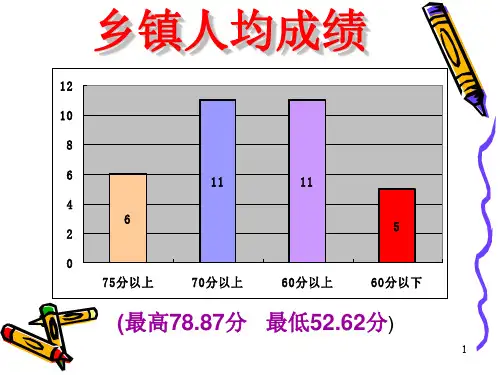小学英语教学质量分析报告 PPT
- 格式:ppt
- 大小:518.50 KB
- 文档页数:27
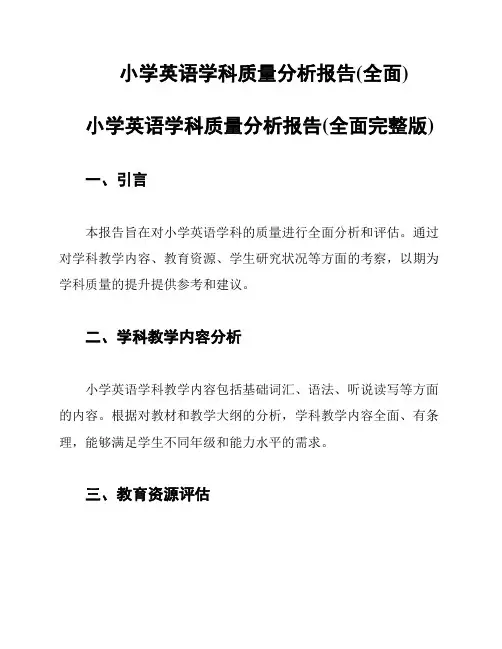
小学英语学科质量分析报告(全面)小学英语学科质量分析报告(全面完整版)
一、引言
本报告旨在对小学英语学科的质量进行全面分析和评估。
通过对学科教学内容、教育资源、学生研究状况等方面的考察,以期为学科质量的提升提供参考和建议。
二、学科教学内容分析
小学英语学科教学内容包括基础词汇、语法、听说读写等方面的内容。
根据对教材和教学大纲的分析,学科教学内容全面、有条理,能够满足学生不同年级和能力水平的需求。
三、教育资源评估
教育资源对学科教学的质量起着重要作用。
经过对小学英语学科的教师配备、教材和教学设备的调查,发现教育资源的配置相对合理,能够满足学生的研究需求。
四、学生研究状况调查
对学生研究状况的调查是评估学科质量的重要环节之一。
通过对小学生英语学科能力的测评和学生研究情况的调查,我们发现学生在英语学科上的表现整体良好,但也存在部分学生在语言表达和听力方面有待提高的问题。
五、问题与建议
根据对小学英语学科的分析和评估,我们提出以下问题和改进建议:
1. 针对部分学生在语言表达和听力方面的问题,可以加强相关教学内容,并提供多样化的练和实践机会。
2. 进一步提升教师的专业素质和教学能力,确保教学质量的稳定和提高。
3. 加强学科教材的更新和适应性调整,紧跟时代发展和教育需
求的变化。
结论
综上所述,小学英语学科在教学内容、教育资源和学生学习状
况等方面表现出良好的态势。
然而,为了进一步提升学科质量,我
们需要关注学生的具体需求,并不断优化教学方法和教育资源配置。
通过持续改善,我们相信小学英语学科的质量会不断提高,更好地
为学生的英语学习服务。

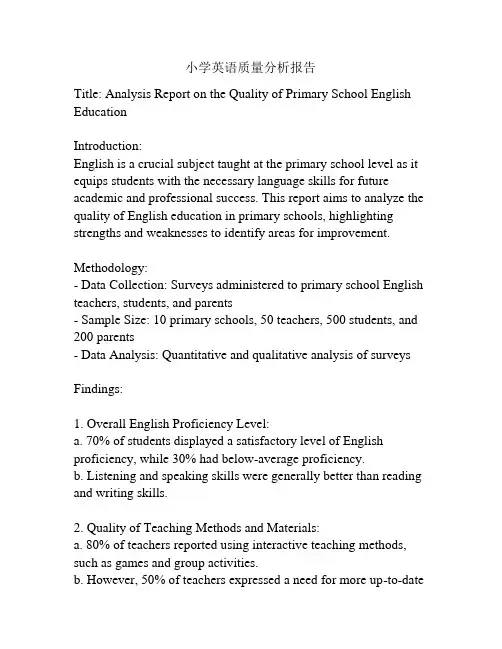
小学英语质量分析报告Title: Analysis Report on the Quality of Primary School English EducationIntroduction:English is a crucial subject taught at the primary school level as it equips students with the necessary language skills for future academic and professional success. This report aims to analyze the quality of English education in primary schools, highlighting strengths and weaknesses to identify areas for improvement. Methodology:- Data Collection: Surveys administered to primary school English teachers, students, and parents- Sample Size: 10 primary schools, 50 teachers, 500 students, and 200 parents- Data Analysis: Quantitative and qualitative analysis of surveys Findings:1. Overall English Proficiency Level:a. 70% of students displayed a satisfactory level of English proficiency, while 30% had below-average proficiency.b. Listening and speaking skills were generally better than reading and writing skills.2. Quality of Teaching Methods and Materials:a. 80% of teachers reported using interactive teaching methods, such as games and group activities.b. However, 50% of teachers expressed a need for more up-to-dateteaching materials and resources.3. Teacher Training:a. 60% of teachers had received professional training in teaching English.b. Teachers expressed a desire for more training opportunities to enhance their teaching skills and stay updated with current methodologies.4. Classroom Environment:a. 90% of students reported feeling motivated and engaged in English classes.b. Small class sizes and supportive teacher-student relationships contributed to a positive classroom environment.5. Parental Engagement:a. 70% of parents expressed satisfaction with their child's progress in English.b. However, 40% of parents felt they lacked the necessary knowledge or resources to support their child's English learning at home.Recommendations:1. Provide Comprehensive Teacher Training: Facilitate regular professional development programs to enhance English teaching skills, including modern teaching methods and the use of up-to-date materials.2. Update Teaching Materials: Collaborate with educationalpublishers to develop age-appropriate and interactive English textbooks and resources to enhance students' reading and writing skills.3. Encourage Parental Involvement: Organize workshops and provide resources for parents to support their child's English learning at home, ensuring a cohesive learning experience.4. Enhance Infrastructure: Allocate funds to improve language laboratories and provide multimedia resources to aid in language learning.Conclusion:The analysis indicates that while primary school English education has achieved satisfactory levels of proficiency for the majority of students, there are areas that require attention and improvement. By implementing the recommended strategies, primary schools can enhance the overall quality of English education and ensure more effective language learning outcomes for students.。

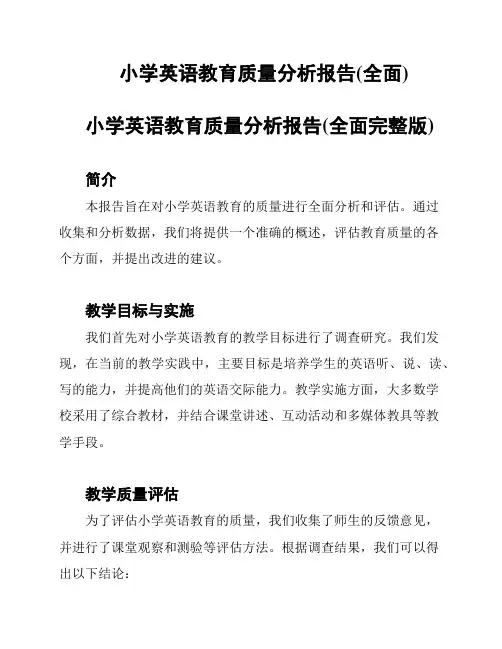
小学英语教育质量分析报告(全面)小学英语教育质量分析报告(全面完整版)简介本报告旨在对小学英语教育的质量进行全面分析和评估。
通过收集和分析数据,我们将提供一个准确的概述,评估教育质量的各个方面,并提出改进的建议。
教学目标与实施我们首先对小学英语教育的教学目标进行了调查研究。
我们发现,在当前的教学实践中,主要目标是培养学生的英语听、说、读、写的能力,并提高他们的英语交际能力。
教学实施方面,大多数学校采用了综合教材,并结合课堂讲述、互动活动和多媒体教具等教学手段。
教学质量评估为了评估小学英语教育的质量,我们收集了师生的反馈意见,并进行了课堂观察和测验等评估方法。
根据调查结果,我们可以得出以下结论:- 学生对英语研究的兴趣普遍较高,积极参与课堂活动;- 大部分教师具备扎实的英语教学知识和教学经验;- 教学内容和教材选择丰富多样,符合小学生的认知特点;- 课堂互动活动和多媒体教具的运用程度有待提高;- 学生对英语听说能力的培养需要更多的练和实践机会。
改进建议根据我们的分析结果,我们提出以下改进建议,以进一步提高小学英语教育的质量:1. 加强课堂互动活动和多媒体教具的使用,提高课堂的趣味性和吸引力;2. 为学生提供更多的口语练和实践机会,增加英语交流的环境;3. 加强教师的培训和专业发展,提高他们的英语教学水平;4. 持续关注学生的研究动态,及时调整教学内容和方法。
结论综上所述,小学英语教育在教学目标与实施方面取得了一定成就,但仍存在改进的空间。
通过采取相应的改进措施,我们可以进一步提高教育质量,为学生提供更好的英语研究环境和机会。
以上是本报告的内容,希望能为小学英语教育的发展提供一些有价值的参考和指导。
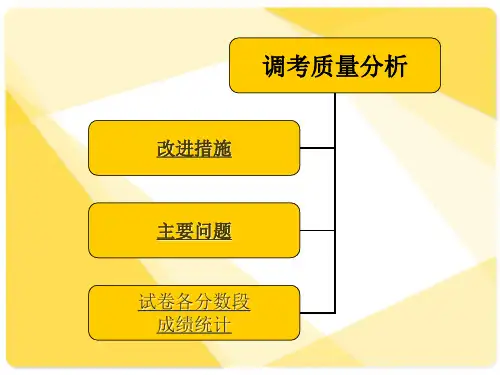

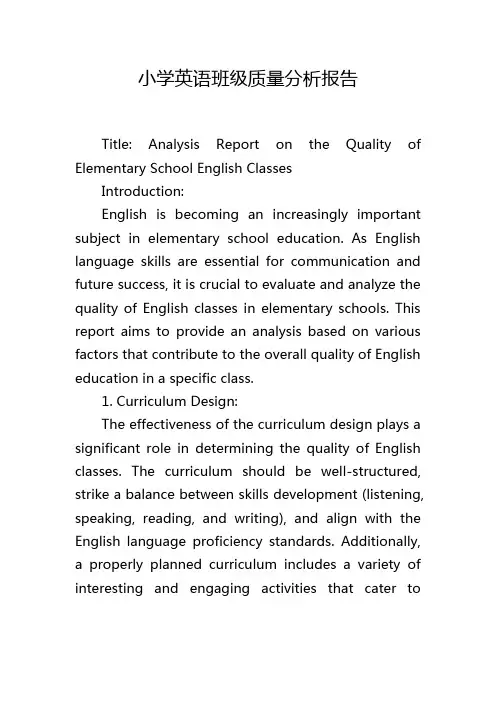
小学英语班级质量分析报告Title: Analysis Report on the Quality of Elementary School English ClassesIntroduction:English is becoming an increasingly important subject in elementary school education. As English language skills are essential for communication and future success, it is crucial to evaluate and analyze the quality of English classes in elementary schools. This report aims to provide an analysis based on various factors that contribute to the overall quality of English education in a specific class.1. Curriculum Design:The effectiveness of the curriculum design plays a significant role in determining the quality of English classes. The curriculum should be well-structured, strike a balance between skills development (listening, speaking, reading, and writing), and align with the English language proficiency standards. Additionally, a properly planned curriculum includes a variety of interesting and engaging activities that cater todifferent learning styles and promote students' motivation and interest in learning English.2. Teaching Methodology:The quality of English classes heavily relies on the teaching methodology adopted by the teachers. Effective teaching methods should be interactive, student-centered, and encourage active participation. Utilizing multimedia resources, such as videos, songs, and interactive games, can enhance students' learning experience. Furthermore, teachers should incorporate communicative activities that provide opportunities for students to practice language skills in a real-life context and encourage independent thinking and problem-solving.3. Teacher's Competency:The teacher's competency is a crucial factor affecting the quality of English classes. Teachers should possess a strong command of the English language and proficiency in teaching methodologies. They should also have a deep understanding of the curriculum, be able to manage the classroom effectively, and adapt teaching strategies to cater to students' individual needs. A competent English teacher creates a supportive and inclusive learningenvironment and provides constructive feedback to help students improve their language skills.4. Student Engagement and Participation:The active engagement and participation of students greatly contribute to the quality of English classes. Teachers should encourage students to actively participate in classroom activities and foster a positive learning atmosphere. Group work, pair work, and role-plays can encourage interaction among students, boost their confidence in using English, and create a collaborative learning environment. It is essential to ensure that all students have equal opportunities to participate and that their progress is regularly monitored and evaluated.5. Assessment and Feedback:The assessment and feedback system in English classes should be well-designed and meaningful. Teachers should use a variety of assessment methods, including formative and summative assessments, to gauge students' learning progress. Regular feedback, both on individual performance and overall class performance, helps students identify their strengths and areas for improvement. It also assists teachers inadjusting their teaching strategies and adapting to students' needs.Conclusion:In conclusion, the quality of English classes in elementary schools depends on several factors, including curriculum design, teaching methodology, teacher's competency, student engagement and participation, and assessment and feedback. By analyzing these factors, schools can identify strengths and weaknesses in their English classes and make informed decisions for improvement. Providing high-quality English education at the elementary level is crucial for building a strong foundation for students' future language development and overall academic success.。
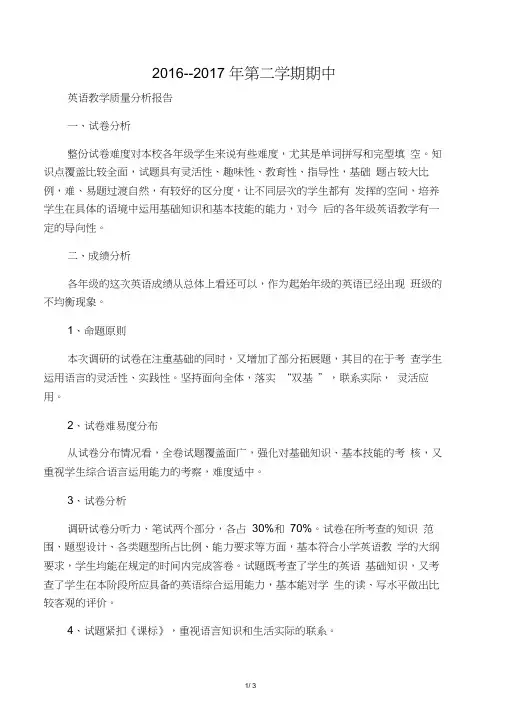
2016--2017 年第二学期期中英语教学质量分析报告一、试卷分析整份试卷难度对本校各年级学生来说有些难度,尤其是单词拼写和完型填空。
知识点覆盖比较全面,试题具有灵活性、趣味性、教育性、指导性,基础题占较大比例,难、易题过渡自然,有较好的区分度,让不同层次的学生都有发挥的空间,培养学生在具体的语境中运用基础知识和基本技能的能力,对今后的各年级英语教学有一定的导向性。
二、成绩分析各年级的这次英语成绩从总体上看还可以,作为起始年级的英语已经出现班级的不均衡现象。
1、命题原则本次调研的试卷在注重基础的同时,又增加了部分拓展题,其目的在于考查学生运用语言的灵活性、实践性。
坚持面向全体,落实“双基”,联系实际,灵活应用。
2、试卷难易度分布从试卷分布情况看,全卷试题覆盖面广,强化对基础知识、基本技能的考核,又重视学生综合语言运用能力的考察,难度适中。
3、试卷分析调研试卷分听力、笔试两个部分,各占30%和70%。
试卷在所考查的知识范围、题型设计、各类题型所占比例、能力要求等方面,基本符合小学英语教学的大纲要求,学生均能在规定的时间内完成答卷。
试题既考查了学生的英语基础知识,又考查了学生在本阶段所应具备的英语综合运用能力,基本能对学生的读、写水平做出比较客观的评价。
4、试题紧扣《课标》,重视语言知识和生活实际的联系。
英语课程标准指出,学生的听说读写技能应该得到均衡的发展,高年级学生在读写发面要进一步加强,这在试题形式上有较好的体现。
四个年级的试题都照顾到了学生的实际能力,着重于基础知识的考察,从词到句再到篇的理解,从听、理解、认读等方面全面考察学生的基础知识掌握情况,比较科学地考察了学生是否能在正确的的语境中正确使用英语的能力。
5、试题形式灵活多样,知识面广,有层次性。
听力检测部分,着重于检测学生在相应的语境中获取信息和理解语言,强调学生的主观理解和实际应用水平,也基本符合学生认知能力的发展规律。
笔试题目中,基础知识的考核照顾到了各个层次的学生,单词辨音,词组翻译,句子书写和整句回答问题等,学生容易得分也容易失分,也能让老师细致观察到学生在基础知识上的具体掌握情况。
